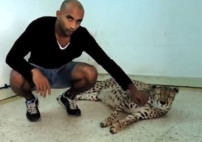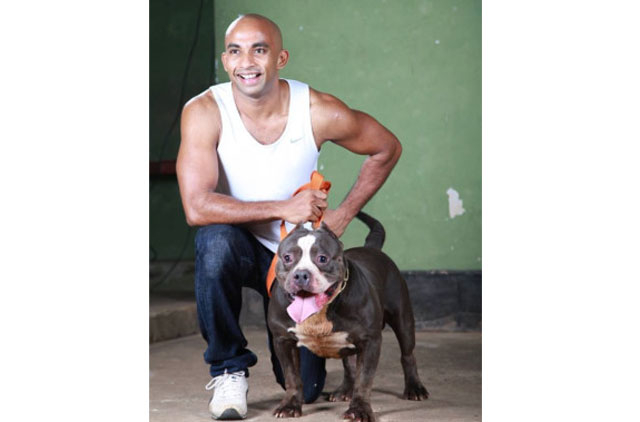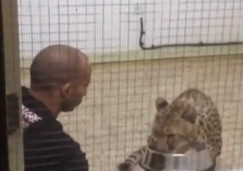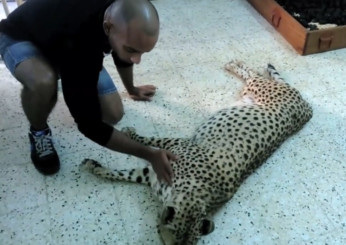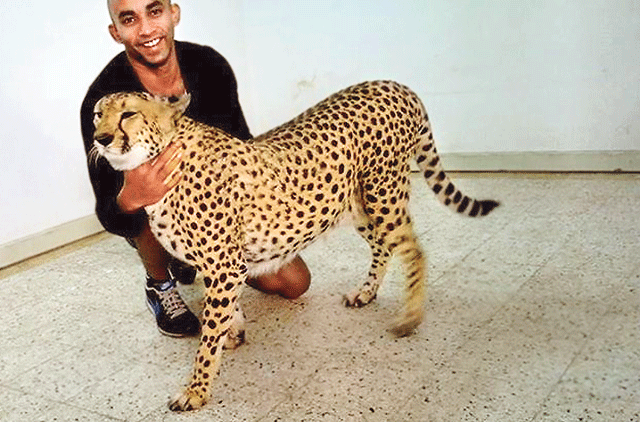
Abu Dhabi: The UAE’s wild pet owners are seeking the services of a dog trainer from Kerala, India, to tame their aggressive pets.
Christo Babu, 32, known as Chris Wolf, has been tasked with the job of taming wild pets after he domesticated a hostile cheetah in Bahrain earlier this year.
“I am flying to Dubai next month to train a leopard,” said Wolf, founder of Wolf N Pack Dog Training and K9 Security Services. His organisation, which has branches in Kerala and Mumbai, specialises in dog training and also offers dogs for security, patrol and drug detection.
A resident of Irinjalakuda in Trichur district of Kerala, Wolf is a graduate in business management and has undergone dog training in Germany.
He said he has been flooded with calls since the Bahrain assignment. “Most calls are from the UAE and other Gulf countries, for handling cheetahs, tigers and leopards. I am not trained for them. I had handled dogs before this so it was quite an experience to share a room with a cheetah.”
Royal assignment
Wolf was flown to Bahrain by a royal family member who had rehabilitated a four-year-old cheetah from Ethiopia.
“It was my first encounter with an adult cheetah. She was locked up in a room, and seven trainers who came before me had failed to even go near her,” recalled Wolf.
“For the first few days, all what I did was unlock the door to the cheetah’s room, peep my head and then lock the door. I did this hundreds of times. I wanted to kill the cheetah’s instinct to attack a human being at first sight. Somehow the plan worked.
“Gradually the cheetah got familiar with my face and I started spending more time with her, armed with nothing more than a tin can. Every time she would rush at me, I would beat the tin can on the floor. The clatter scared her and she kept away from me. The first step was to teach the animal to share space with me.
“Next up was building trust. I would keep some meat lumps in a tray and stand next to it. Initially, the cheetah would grab them and run away. So I started tying the meat lumps on the tray handles so that she would be forced to have her food in front of me.”
The trick, Wolf says, was to act neither as the prey nor the predator. “You should not display any flight or fight syndrome because animals will immediately sense if you are in fear or in combative mood. I remained listless, and did not even make eye contact with the cheetah when it was standing next to me,” said Wolf.
That proximity helped him build a bond with the beast, and he could eventually get her onto a leash.
“I tightened the leash whenever she got aggressive and slowly she learned to behave.”
After spending 29 days with the cheetah – eating, bathing and sleeping in the same room with her – Wolf says the mission was accomplished.
And now he is set to take on the wild in the UAE. “I want to specialise in this field because it is a growing market, especially in the GCC,” said Wolf, who is planning to open a Big Cat Boarding and Training Centre in Dubai by 2015.
UAE laws prohibit imports of exotic animals for personal or commercial purposes. The list of animals banned for private keeping includes cheetahs, tigers, leopards, jaguars and pumas and all kinds of primates as well as wolfs, alligators, walruses, etc. But according to experts, these laws which came out in July 2013 do not affect existing owners. In the past, such owners are known to have surrendered their wild pets to animal centres once they became big and difficult to control.
When asked about the illegality of keeping wild pets in the UAE, Wolf said the wild animal has a better chance of surviving and procreating when they are domesticated.
“It is tougher for them to survive in the wild these days. Many species are getting extinct. But I feel they are safer under the custody of people who love and protect them as their pets,” he said.


